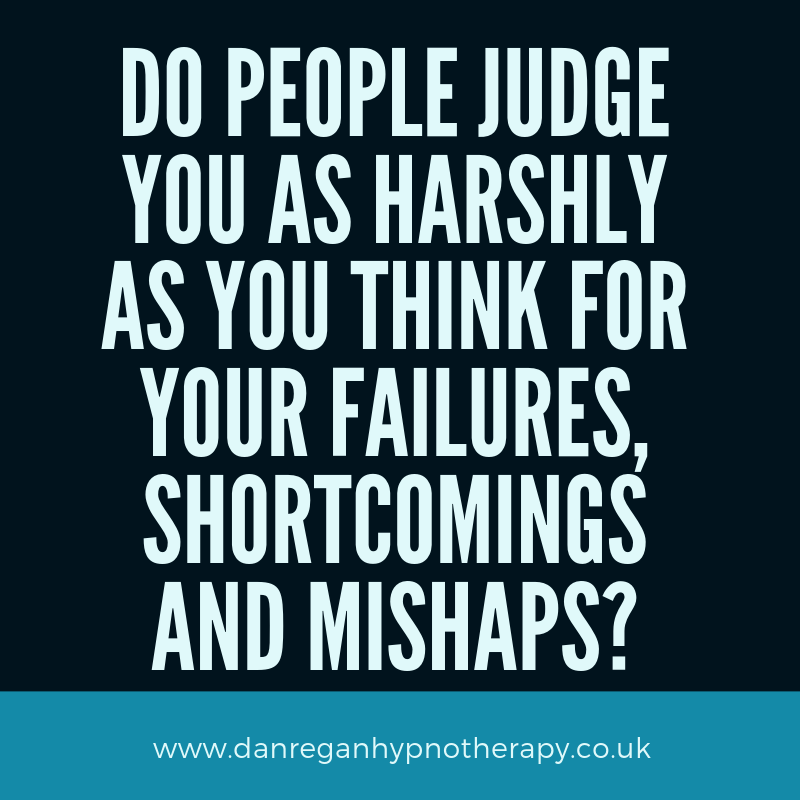Do Others Judge You As Harshly As You Think When You Mess Up? Anxiety & Fear of Failure
When we mess up, fail at something, do something embarrassing or blunder in some way, we are often certain in our minds that other people are judging us and thinking negatively of us. More than that, we assume they are judging us harshly and think we are an idiot or not good enough or a failure in some way.
In practice, even the thought that you might mess up, fail or do something embarrassing may be enough to even stop you attempting that that thing in the first place. You don’t want to end up having people thinking badly of you so you don’t take the risk.
But although you may worry about what other people will think about you if you mess up, are they actually thinking in that way? Do others judge you that harshly if you make a mistake?
I’ve written in earlier articles about our human tendency to overestimate how much attention other people are paying to our appearance and behaviours and about how we tend to believe that we stand out in the eyes of others more than we actually do (have a read of that previous article here: Why You Should Probably Worry Less About What Other People Think About You – The Research on Fear of Failure and Being Judged). As I write about there, the research shows that a great many of your fears about what others think and fear of failure may be misplaced or exaggerated. Other people are less likely to notice or remember your shortcomings than you typically expect.
Yet is that really also the case where we do something embarrassing or mess up in some way. Do people really judge us as harshly as we might think?
Anxiety & Fear of Failure
When I used to struggle with anxiety, the fear of messing up or doing something that would make me come across as an idiot would loom large in my mind. That could be worry about going for a job interview and not getting it so that everyone would think I was a not good enough failure. That could be messing up a presentation from being too anxious and so people would (I figured) think I was rubbish at my job. And between you and me, if a very senior person came to the office and was wandering around casually chatting to people then I would make myself scarce for fear of saying something stupid (or being too anxious to say anything at all).
And it would also be there in social situations. where I could get myself into knots about what to wear (so no one thought I looked a fool) and about what I would say to people and about saying something stupid or offending someone in some way. Hardly a great way to start a night out!
Thankfully those days are long gone! These days I can fall flat on my face at bootcamp and find myself laughing about it.
Recently, I had just one of those times that in the past would have haunted my thoughts for days afterwards. Having not run a race for three years due to a hip problem, I recently decided to bite the bullet and head off to Suffolk to run a 5k race followed by a 10k race. As might be expected after such a gap (and as I wondered why I had chosen to enter both races!), I was a bit nervous about the whole thing. Not a lot but just a bit or adrenaline and eagerness and wondering what I’d let myself in for and how I would perform.
Just before the first race, the race director did a short briefing for the twenty or so of us running about the course and the first run. During his briefing he asked whether it was anyone’s first 5k and my hand instantly shot up in the air. About the moment that twenty plus faces turned to look at me, I realised my mistake. I thought he meant is it anyone’s first 5k at the venue but what he actually meant was whether it was anyone’s first 5k EVER!!
As innocuous a mistake as it may seem, this is the sort of thing that would have killed me a bit on the inside years ago. I’d messed up, everyone had seen it and I would have thought they were thinking I was an idiot (I was wearing a marathon finisher’s T-shirt at the time for goodness sake!!!). In the past this would have made me shut off and would have dominated my mind for hours, if not days. The fact that someone came up to me after and congratulated me for running so well ‘for my first 5k’ would have poured fuel on that old anxiety fire (instead I just laughed and explained my mistake). It’s easy to see how someone could feel their image had been tarnished by such a social mishap, however small it may seem to be (in fact, in the past I would probably have decided never to return to the place ever again!).
Outside of that moment, it was great to get back into racing again, even if my endurance fitness is way off where I’d like it to be. It was baking hot and after that first 5k race, I was just pleased to drag myself around the 10k!
Do Others Judge You As Harshly As You Think?
We already know from the previous research I’ve written about that we overestimate the extent to which our actions and appearance are noted by others (Gilovich et al (2000)). We tend to believe that other people take more note of our actions and appearance than is actually the case.
As the research evidences, people tend to believe that they stand out in the eyes of others, both positively and negatively, more than they actually do. Thus any fears you may have about what other people think, about a fear of failure and being judged negatively by others, are overestimated by you and often simply incorrect. And even if you did something and it didn’t go as well as you hoped, other people are less likely to notice or remember those failures, shortcomings and mishaps that you had expected.
But of course, just because you have been exaggerating how likely it is for others to notice if you mess up, there is still the risk that any mistake or failure will be noticed by others. Many of your worries about it may have been misplaced yet someone may notice you have failed. The worry then becomes about whether, having noticed your shortcoming or mishap, will you then be judged harshly by others for it?
And it turns out that not only do people overestimate the extent to which others notice their actions and appearance, and not only do people overestimate the extent to which others can discern your internal states, but people also overestimate the extent to which others judge them harshly if they do make an embarrassing blunder or mishap. Our perceptions, beliefs, expectations and our thinking are wide of the mark in all these social areas.
“When people experience a potentially embarrassing event, they often expect to be judged harshly by others – significantly more harshly than they actually are” (Savitsky, Epley & Gilovich,. Do others judge us as harshly as we think? Overestimating the impact of our failures, shortcomings, and mishaps (2001)).
Do other people judge you as negatively as you may think? No, people are less likely to form negative impressions than you may typically expect.
In their research, Savistsky et al (2001) demonstrated that people expected to be judged more harshly for a social faux pas (such as being the only person at a party not to bring a gift) than is actually the case. The same applied in a study looking at intellectual shortcomings where people performed badly in a test and expected to be judged more harshly by observers than they actually were. And in another experiment, participants who experienced a public embarrassment (being described in an unflattering way to an observer) overestimated the impact that unflattering information would have on the observer’s impression of them.
Do Others Judge You Harshly? Overestimating The Impact Of Failures, Shortcomings and Mishaps
We have a pessimistic view of other people’s judgements that means we expect to be judged more harshly for failures, blunders and mishaps than is actually the case. That anxiety about messing up and being judged harshly may mean you avoid things, don’t do things or take action while filled with tension, anxiety and fear. The research shows that we are overestimating those fears of others judging you harshly, so how is it that our expectations are so wrong?
Well, firstly, as we’ve mentioned before, there is a tendency to overestimate how much what we are doing is noted by others. Because we think people are more likely to notice mistakes, we then think that having noticed them, we will be judged harshly (after all, if no-one notices that mishap or shortcoming then there is nothing to worry about).
Certainly, part of this misplaced perception of being judged harshly stems from how prevalent those failures are in your own mind. If you mess up or do something embarrassing, you are likely to focus on it massively in terms of your own thoughts and feelings. As you focus all your attention on it, you also give it more weight when attempting to ascertain what others are thinking about you. As you focus so much on that failure, you neglect to take a whole range of other factors into consideration.
“Because blunderers often neglect to consider the role that nonfocal factors play in others’ judgments of them, they overestimate how harshly they will be judged” (Savistsky et al).
For example, when making their judgement of your mishap or failure, the other person is likely to take into account a whole range of other information, such as memories of past interactions with you, their pre-existing impressions of you and what was going on both before and after the mishap. As you will recognise from your own view when you notice someone fail or do something embarrassing, that thing does not occupy centre stage in your own thoughts, there are all sorts of other things that will be going on in your own mind and in the environment that also compete for your attention.
One thing that we may fail to take into account is that people noticing our failure of blunder may demonstrate empathy with us. Most of us have, at one time or another, failed at something, said or done something embarrassing or fallen short in some way. So that when we observe someone else doing something along those lines, our thoughts may be more empathetic than harsh. We often commiserate with the other person rather than condemn them.
“People may commonly fail to appreciate the extent to which those who have “been there, done that” are likely to empathize with their misfortune and withhold harsh judgment” (Savitsky et al).
And, of course, although when we experience a potentially embarrassing event we expect to be judged harshly by others, it may be that we are just over cynical in our view of others. Perhaps, after all, not all other people are inclined to see the worst in people. Perhaps people don’t think as poorly of others as we may have previously assumed.
As the researchers discuss, there is adaptive value in being sensitive to the reactions we elicit in others. Throughout human evolution, incurring unfavourable judgements by others could lead to disapproval or ostracism and could have had disastrous consequences. Someone who is not sensitive to their impact runs the risk of being excluded from their social network.
“Although a tendency to overestimate rather than underestimate the harshness of others’ judgments might still be an effective “strategy” or stance toward everyday life, it is a strategy that works less well than it once did. Its benefits do not as clearly outweigh its considerable costs. The costs, of course, are the needless worry and anxiety that result from an unwarranted fear of others’ judgments. In extreme cases, an excessive concern over how we are seen by others can give rise to a host of debilitating social disorders” such as speech anxiety, shyness, social phobia and paranoia.
Ending Anxiety About Being Judged Harshly
If we mess up, fail, fall short or blunder, we tend to overestimate how harshly we will be judged by others. Our fears are exaggerated by our own focus on that thing when making an assumption of what others are thinking. Our exaggerated viewpoint can then cause us anxiety and worry.
That anxiety and worry can even be there before you do something, because of the risk of messing up, failing or doing something embarrassing in front of others that they will judge you negatively for. You may avoid socialising, taking an opportunity, speaking to someone you like, public speaking or a whole host of other things because of your misplaced fear of how others will react if something goes wrong or you make a mistake. The feelings of anxiety and dread you experience may be all too real, the beliefs and perceptions that drive them may be less concrete and accurate.
Do others judge you harshly? The message, loud and clear, from this research (and the others I’ve written about recently) is that you can and should put aside concerns about what others do or might think and instead get out and do the things that you want to do. The biggest regrets anyone ever has are over the things that they haven’t done but wished they had. Don’t be one of those people who look back on their life with regret because of exaggerated anxiety about what other people are thinking. The chances are they aren’t thinking it at all.
As Savistsky et al conclude, “Our message then, in its simplest form, is one of liberation: People can put aside some of their concern about others’ reactions when deciding what choices to make in life because the audience they are so concerned about is seldom as judgmental and attentive as they believe.”
To your success,
Dan Regan
Hypnotherapy in Ely & Newmarket
Seeking help to overcome your anxiety, fear and worry so you can and increase your confidence and self-esteem? Book your Complimentary Hypnotherapy Strategy Session with Dan now: Appointments
Find out what many other people have said after their hypnotherapy sessions with Dan: What People Say
And check out these powerful hypnosis downloads that can start helping you right away: Hypnosis Downloads
References:
Savitsky, Kenneth, Nicholas Epley, and Thomas Gilovich. “Do others judge us as harshly as we think? Overestimating the impact of our failures, shortcomings, and mishaps.” Journal of Personality and Social Psychology 81, no. 1 (2001): 44.
Gilovich, Thomas, Victoria Husted Medvec, and Kenneth Savitsky. “The spotlight effect in social judgment: An egocentric bias in estimates of the salience of one’s own actions and appearance.” Journal of personality and social psychology 78, no. 2 (2000): 211.






0 Comments